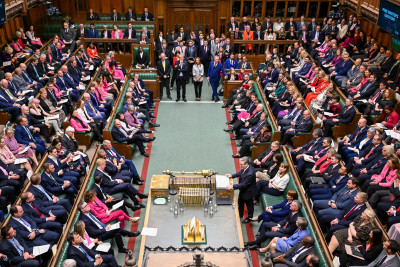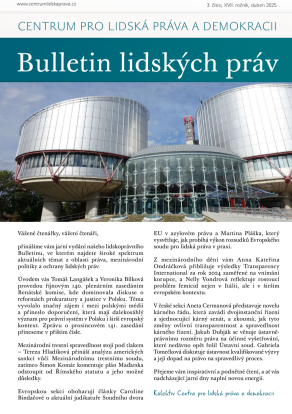Could serving a sentence without a clear end in the United Kingdom be considered psychological torture? Is it possible for a person to spend 17 years in prison for attempted robbery? Furthermore, what is the connection between these issues and human rights in the United Kingdom?
It is the UN Special Rapporteur on Torture and Other Cruel, Inhuman or Degrading Treatment or Punishment (UN Special Rapporteur) who is tasked with investigating human rights violations and intervening when necessary. When preparing reports for the Human Rights Council and the General Assembly, the UN Special Rapporteur uses various reliable sources, including complaints from individuals and information from non-governmental organizations.
Alice Jill Edwards, an Australian lawyer who holds the position of UN Special Rapporteur, regularly draws attention to the situation in British prisons, Particularly to individuals who have been sentenced indefinitely, with the so-called "tariff" representing the minimum length of their sentence. Individuals are given a minimum term, or "tariff," which is the minimum time they must serve before being considered for parole. Release depends on whether a parole board determines they no longer pose a danger to society. The sentence has been controversial due to its indefinite nature and the uncertainty faced by prisoners, many of whom struggle to meet the conditions for release. These punishments are officially called imprisonment for public protection (IPP).
What Is an IPP and Why Is It Being Talked About Now?
IPP was introduced in England and Wales in 2005. It was intended for people considered "dangerous" but whose crime did not merit a life sentence. The IPP contains the following three elements:
1) The minimum time (so-called tariff) that a person must spend in prison, which is considered a fair time for the crime committed. If a person serves the tariff, he or she can be paroled based on a decision by the Parole Board.
2) A prisoner's release is never automatic, and prisoners can be held in prison for a potentially indefinite period of time until they demonstrate that they no longer pose a threat to the public and that it is safe to release them.
3) Release of prisoners on license, with the possibility of returning to custody. The license remains valid until its termination. People serving an IPP sentence are currently eligible to have their license terminated ten years after their first release following the consideration of the Parole Board. A breach of the license conditions may result in re-imprisonment. If the persons are re-incarcerated, they must remain in prison until the Parole Board is satisfied and concludes that custody is no longer necessary for the protection of the public.
However, it has become increasingly clear that this punishment has had unpredictable consequences, as people continue to be detained even many years after the tariff has expired. Apparently, also for that reason, this method of punishment was abolished in 2012. However, this change was not retroactive and thus did not apply to prisoners who were already serving such sentences at that time.
Prisoners in British and Welsh prisons who are sentenced to IPP remain in many cases behind bars years after their tariff date has passed. This fact was revealed by newly published documents from the British Ministry of Justice.
How Many Prisoners Are Affected?
As of 31st of March 2024 there were 1 180 non-released prisoners who were placed on IPP between 2005 and 2012. By March 2024, all but 13 prisoners had already met the IPP tariff imposed on them. For example, even after sixteen years, there are still five men in prison who were sentenced with a six-month tariff.
In addition to the above-mentioned, the published data showed fifteen prisoners with a tariff of between six months and a year, and another forty-seven with a tariff of between a year and eighteen months. They were all convicted before 2008, but they remain behind bars to this day. At the time, it was assumed that all those sentenced would be released as soon as possible after passing their tariff date.
IPP sentences were abolished due to concerns that they violate human rights. Although it has never been officially confirmed, it is believed that around ninety people so convicted committed suicide either in prison or while on parole.
For example, consider the case of Tommy Nicol convicted of stealing a car. He was given an IPP sentence, meaning he was held indefinitely in prison without a clear release date, subject to a parole board's assessment of his risk to society. Despite having served several years and showing signs of rehabilitation, Nicol’s requests for parole were denied twice. In 2015, he tragically took his own life. Similarly, Jason Cressey has been in prison for several years after serving his minimum tariff and like many IPP prisoners, he was not able to get released, despite meeting all the criteria set out in his rehabilitation plan.
The above-mentioned facts also resonated in the British Parliament. The debate over the numbers of such convicts was followed by the announcement of the British Prisons Secretary James Timpson, that more than a thousand of those released will have their conditions revoked and will be completely free again. The upcoming amendment to the Victims and Prisoners Act (the Act) has not yet entered into force but should bring much-needed changes to tariff penalties.
The Amendment
Section 66 of the Act, which has not yet entered into force, should bring significant changes. The change will be implemented in two phases. As of November 2024, a new automatic IPP license termination process will commence in the cases where the Parole Board has decided (or has previously decided) not to terminate a person's license after the three-year qualifying period. In such cases, the license will subsequently be automatically terminated if the person proves himself and does not commit another offense for the subsequent two years.
From 1st February 2025, the Parole Board will review license termination. Anyone whose IPP license has not yet been reviewed by the Parole Board and who is not yet eligible for automatic termination of sentence will have their IPP license reviewed by the Parole Board no later than three years after it was first issued.
What Does This Imply?
Execution of a punishment without a clear end constitutes a form of psychological torment. Torture survivors say that it is worse than any physical violence.
Prisoners with IPP sentences rarely have access to the rehabilitation programs needed to demonstrate a decrease in their risk to the public. It is thus very difficult for them to persuade the Parole Board to release them when they do not have opportunities to engage in activities that would support their case for release.
However, release is not the end of the struggle for IPP prisoners, as they continue to face numerous difficulties. IPP inmates are at risk of being recalled to prison for minor infractions, such as being late for an appointment with a probation officer or admitting suicidal thoughts to a probation officer.
The UK, like any society with a strong rule of law, should therefore consider whether measures to protect society after the release of prisoners can be reformed. It is not acceptable to impose sentences with no clear end in sight, as this undermines the principles of justice and rehabilitation. If society chooses to lock people up without providing a meaningful path to reintegration, it is neither a legal nor a moral solution. True justice should involve not only protecting the public but also offering individuals the opportunity to reintegrate and lead productive lives after their sentences.
Remarks
[1] “Release on license” refers to the conditional release of a prisoner from custody, allowing them to live in the community under certain conditions and supervision..
Source
Vše o OSN. Ochrana lidských práv (2014). Informační centrum OSN v Praze. Available at: https://osn.cz/wp-content/uploads/2022/08/vse-o-osn-lidska-prava.pdf
Beard, J. (2024, October). Sentences of Imprisonment for Public Protection. House of Commons Library. Available at: https://researchbriefings.files.parliament.uk/documents/SN06086/SN06086.pdf
Allison, E., Grierson, J. (2024, November). UK government pays out to family of IPP prisoner who killed himself. The Guardian. Available at: https://www.theguardian.com/law/2020/nov/30/uk-government-pays-out-to-family-of-ipp-prisoner-who-killed-himself-tommy-nicol
Rogers, A. (2024, July). Sister’s plea to new prisons minister James Timpson over brother’s indefinite jail sentence. Sky News. Available at: https://news.sky.com/story/sisters-plea-to-new-prisons-minister-james-timpson-over-brothers-indefinite-jail-sentence-13187500
UK: UN torture expert calls for urgent review of over 2,000 prison tariffs under discredited IPP sentencing scheme. (2023, August). United Nations Human Rights Office of the High Commissioner. Dostupné z: https://www.ohchr.org/en/press-releases/2023/08/uk-un-torture-expert-calls-urgent-review-over-2000-prison-tariffs-under
Photo
UK Parliament, author: unknown, 16 October 2024, source: flickr, CC BY-NC-ND 2.0 DEED.


